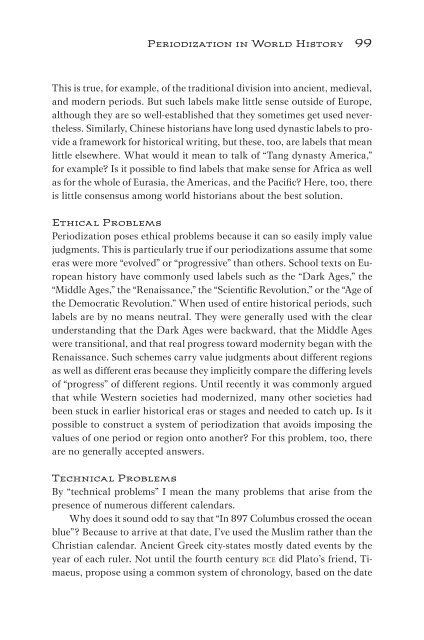This Fleeting World
This Fleeting World
This Fleeting World
You also want an ePaper? Increase the reach of your titles
YUMPU automatically turns print PDFs into web optimized ePapers that Google loves.
Periodization in <strong>World</strong> History 99<br />
<strong>This</strong> is true, for example, of the traditional division into ancient, medieval,<br />
and modern periods. But such labels make little sense outside of Europe,<br />
although they are so well-established that they sometimes get used nevertheless.<br />
Similarly, Chinese historians have long used dynastic labels to provide<br />
a framework for historical writing, but these, too, are labels that mean<br />
little elsewhere. What would it mean to talk of “Tang dynasty America,”<br />
for example? Is it possible to find labels that make sense for Africa as well<br />
as for the whole of Eurasia, the Americas, and the Pacific? Here, too, there<br />
is little consensus among world historians about the best solution.<br />
Ethical Problems<br />
Periodization poses ethical problems because it can so easily imply value<br />
judgments. <strong>This</strong> is particularly true if our periodizations assume that some<br />
eras were more “evolved” or “progressive” than others. School texts on European<br />
history have commonly used labels such as the “Dark Ages,” the<br />
“Middle Ages,” the “Renaissance,” the “Scientific Revolution,” or the “Age of<br />
the Democratic Revolution.” When used of entire historical periods, such<br />
labels are by no means neutral. They were generally used with the clear<br />
understanding that the Dark Ages were backward, that the Middle Ages<br />
were transitional, and that real progress toward modernity began with the<br />
Renaissance. Such schemes carry value judgments about different regions<br />
as well as different eras because they implicitly compare the differing levels<br />
of “progress” of different regions. Until recently it was commonly argued<br />
that while Western societies had modernized, many other societies had<br />
been stuck in earlier historical eras or stages and needed to catch up. Is it<br />
possible to construct a system of periodization that avoids imposing the<br />
values of one period or region onto another? For this problem, too, there<br />
are no generally accepted answers.<br />
Technical Problems<br />
By “technical problems” I mean the many problems that arise from the<br />
presence of numerous different calendars.<br />
Why does it sound odd to say that “In 897 Columbus crossed the ocean<br />
blue”? Because to arrive at that date, I’ve used the Muslim rather than the<br />
Christian calendar. Ancient Greek city-states mostly dated events by the<br />
year of each ruler. Not until the fourth century bce did Plato’s friend, Timaeus,<br />
propose using a common system of chronology, based on the date


